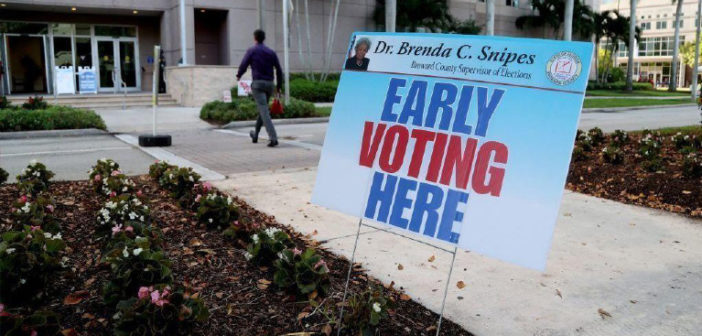Citizens in Florida are already beginning to vote as we quickly approach the Nov. 6 formal voting date. This midterm, we’re electing the governor, representatives, senators and voting on amendments. However, amendments are special amongst these because they are not a person, they are a concept, and as such can get very confusing in how they are worded. There are 12 amendments this year on the ballot, and what do they actually mean when they are worded so confusingly?
Amendment 1
Amendment 1 is a bill to increase the exemption to the homestead property tax. A homestead property tax exemption is a tax exemption that occurs when a house is over a certain value and saves the homeowners a couple of hundred dollars a year in taxes. Amendment 1 is attempting to give homeowners with homes valued more than $125,000 an additional $25,000 exemption. While this would save homeowners money, it would also cost Florida’s cities and counties an approximated $690 million. This loss in taxes would result in cuts to services, higher local rates and other places for higher local taxes to compensate for the loss of money.
Amendment 2
Amendment 2 is another tax bill that makes permanent a currently temporary cap of 10 percent on annual property value increases. This means that any vacation home, apartment and commercial properties would only be able to increase 10 percent a year property value wise. This would end up with lower tax bills but would once again continue to deny local governments the tax revenue they would otherwise collect.
Amendment 3
Amendment 3 is a bill that would limit gambling in Florida, requiring any new casino gambling decisions to be made through an amendment, rather than the legislature. This would mean that any new gambling decisions would have to be made as an amendment on a future ballot. This is a good bill and supported by Disney, the Seminole Tribe of Florida, the League of Women Voters of Florida and No Casinos Inc. Obviously, casino owners want this to fail so that any pro-gambling decisions can be lobbied for and easier to pass.
Amendment 4
Amendment 4 is arguably the most important issue on this year’s ballots and would allow felons to vote in Florida after their time has been served, excluding those convicted of sex crimes and murder. According to the Governer’s Clemency Board, this would help lower recidivism rates, employment rates, prison costs and have a positive effect on the economy. Florida is currently one of only four states that ban felons from voting for life and is a notably racially imbalanced rule. To learn more about Amendment 4, find Madison Whatley’s deeper look into it on page 5 in “Vote Yes on 4, say Yes to Fair Elections for All Floridians”.
Amendment 5
Amendment 5 would, if passed, require for a supermajority vote of 66 percent to pass any bills that raise state taxes or fees. This means that if a bill were to come to the state legislature, 66 percent of the legislatures would need to agree to pass the bill. This is a very biased bill and could lead to a case where if a democratic majority were to come into the state legislature, they would not be able to pass any taxation legislature unless they had 66 percent of the vote. This is an attempt to help keep taxes down even if conservative lawmakers were to lose their majority in Congress. This also means that if the Democratic candidate for governor, Andrew Gillum, were to win that it would be even harder for him to pass any of the plans he has. This bill is opposed by the League of Women Voters of Florida, the Florida Education Association and the Southern Poverty Law Center.
Amendment 6
Amendment 6 is a particularly confusing one, as it says to expand the rights of victims of crime. However, it also has some things hidden in the writings. The amendment would enshrine in the state constitution many victims’ rights that are alrighty in state law, place new time limits on filing appeals, requiring that victims receive written notification of their rights and eliminate an existing constitutional provision that ensures victims’ rights don’t infringe on the rights of the accused. The bill also includes a change that would raise the mandatory age for Supreme Court justices and judges from 70 to 75 and would prohibit courts and judges from deferring to an administrative agency’s interpretation of laws when deciding a case.
This amendment has it’s good and bad parts. The victims’ rights section is mostly good, working off of Marsy’s Law which is a Californian bill of rights act to give victims’ rights. However, it seems that the Marsy’s Law section is being used to bait voters into also passing the two hidden parts into law when they should be their own amendments.
It should also be mentioned that this bill would allow victim’s rights to overwrite the accused’s constitutional rights. These are all reasons that the bill is being opposed by many of the state’s newspapers, the ACLU of Florida, the League of Women Voters of Florida and the Southern Poverty Law Center. This is the type of bill designed to trick voters and should be stopped.
Amendment 7
Amendment 7 is a big one and deals with universities in Florida, first responders and military families. Amendment 7 would force universities to get a supermajority approval from the state Board of Governors to increase student fees and would make the governing framework for state colleges a part of the constitution.
Amendment 7 would also create a constitutional requirement for the government to pay death benefits to first responders and members of the military who are Florida residents or are stationed in Florida. Amendment 7 is opposed by several of the liberal organizations in Florida, stating that the members of the military who die are already given benefits by the federal government and saying that the supermajority clause for universities is once again a power move by conservative members of the legislature. This is why it is opposed by the Florida Education Association and League of Women Voters of Florida.
Amendment 8
Amendment 8 was found to violate the state constitution and was removed from the ballot by the Florida Supreme Court for purposefully misleading voters.
Amendment 9
Amendment 9 does two positive things for the environment and people around the state. The amendment prohibits offshore oil and gas drilling, and also prohibits vaping in enclosed indoor workplaces. This is a simple and very positive bill, protecting the Gulf of Mexico from oil spills and drilling and also protecting citizens from the possible secondhand inhalation problems from e-cigarettes.
Amendment 10
Amendment 10’s official text reads: “…Requires the Legislature to hold its session in early January on even-numbered years; creates an Office of Domestic Security and Counterterrorism within the Florida Department of Law Enforcement; mandates the existence of a state Department of Veterans’ Affairs; forces all counties to elect a sheriff, tax collector, property appraiser, supervisor of elections and Clerk of Circuit Court.” This does several things, and most notably limits the voters in local charter county areas from deciding on their own county officials. Some of it is also redundant as the state constitution already has the power to set specific dates during even-numbered years and has already authorized the legislature to create of Department of Veteran Affairs.
Amendment 11
Amendment 11 would repeal a century-old law that allows the Legislature to restrict the property rights of non-citizens and would delete language from the onstitution that is obsolete and would allow criminals to be prosecuted by law even if that law has been changed by the Legislature. This is a simple pass and just helps clean up the already confusing state constitution.
Amendment 12
Amendment 12 would expand ethics rules for elected officials and government employees by expanding from two to six years the time that officials would need to wait before being able to become a lobbyist. A lobbyist is someone who tries to persuade or lobby state officials into doing a certain thing that they want to do for a reason. For example, the federal government is heavily lobbied by the tobacco industry to not pass tobacco legislation. Knowing this, and how powerful lobbying is, it’s clear that this needs to pass to better unbias our state officials.
Amendment 13
Finally, amendment 13 would ban gambling on dog races, effectively banning greyhound races in Florida. Not only is this a gambling issue, but it is also an animal cruelty issue. Greyhound racing is known for being very cruel to the animals involved, and banning it is supported by Grey2K USA and the League of Women Voters of Florida.





